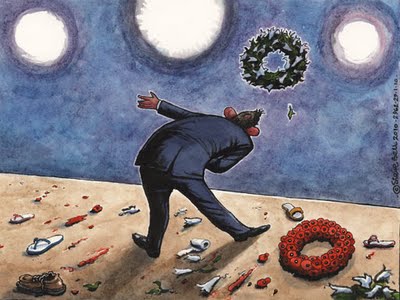Blair before Brown.
To call Gordon Brown's appearance before the Chilcot inquiry deeply underwhelming would be putting it too kindly. Boring, mundane, and mind-numbing would all be more suitable. While Blair's sessions were compelling if not always electrifying, they were indicative of his overall character: defiant, certain, convinced of his own righteousness. Brown merely had all his bases covered, and was incredibly well prepared, as you'd expect.
The one thing we've never learned, and which Andrew Rawnsley's book hasn't touched on, is just how much Brown really did believe in the Iraq war. He naturally defended it today, even if he did so on the equally spurious grounds that Iraq wasn't living up to its international commitments, rather than on its non-existent WMD and the intelligence as presented then, although why he continued on insisting that there was no possibility of a second resolution because of Chirac's intransigence, the classic Downing Street smear from the time, was a moment of dishonesty. As we know from Clare Short's evidence, this was happening at a time when Brown was being shut out from the Blair circle, which goes some way to explaining why he hadn't seen many of the documents from the time which the committee asked him about. Equally though there is more than a reminder of Brown's similarity with Macavity, the mystery cat, who isn't there when there's dirty work to be done. It always helped Brown to not be associated personally with the war, even if he was the one writing the cheques. His evidence didn't shed any light on this, but that was to be expected.
While Brown shares responsibility with Blair, as indeed the whole cabinet at the time does, and if you want to stretch it even further, all those in parliament who voted for the war, it's Blair that is always going to remain the one person associated with the decision, for either good or bad, and whatever conclusion the Chilcot inquiry eventually comes to, that also is unlikely to change.
The one thing we've never learned, and which Andrew Rawnsley's book hasn't touched on, is just how much Brown really did believe in the Iraq war. He naturally defended it today, even if he did so on the equally spurious grounds that Iraq wasn't living up to its international commitments, rather than on its non-existent WMD and the intelligence as presented then, although why he continued on insisting that there was no possibility of a second resolution because of Chirac's intransigence, the classic Downing Street smear from the time, was a moment of dishonesty. As we know from Clare Short's evidence, this was happening at a time when Brown was being shut out from the Blair circle, which goes some way to explaining why he hadn't seen many of the documents from the time which the committee asked him about. Equally though there is more than a reminder of Brown's similarity with Macavity, the mystery cat, who isn't there when there's dirty work to be done. It always helped Brown to not be associated personally with the war, even if he was the one writing the cheques. His evidence didn't shed any light on this, but that was to be expected.
While Brown shares responsibility with Blair, as indeed the whole cabinet at the time does, and if you want to stretch it even further, all those in parliament who voted for the war, it's Blair that is always going to remain the one person associated with the decision, for either good or bad, and whatever conclusion the Chilcot inquiry eventually comes to, that also is unlikely to change.
Labels: Chilcot inquiry, Gordon Brown, Iraq, Iraq disaster, politics, Tony Blair


